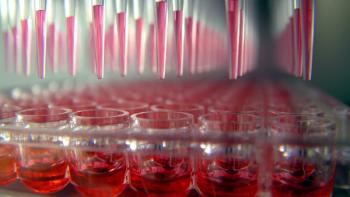
- BioPharm International-02-01-2019
- Volume 32
- Issue 2
What’s New in Lab Automation
The latest in automation solutions for pharmaceutical laboratories include products in endotoxin detection, liquid handling, and lab workflows.
With more operational activities in the lab becoming automated, manufacturers are stepping up to the task of supplying scientists and lab technicians with the automation solutions necessary to facilitate accuracy and innovation. The following are a sampling of such products.
Automated plate-based robotic solution for endotoxin detection
The PyroTec PRO from Lonza is a fully automated, plate-based robotic solution for endotoxin detection (1). Integrated with the latest version of the company’s proprietary dynamic control WinKQCL 6.0 Software platform, the new system is suited to meet the needs of changing requirements of quality control (QC) testing laboratories for fully automated processing of simple to complex sample matrices, according to the company.
System features include improved data integrity with the capture of new metadata from the automated preparation, adding traceability into tracking, trending, and audit controls; taking any new and existing templates and dynamically ‘script’ the instructions to an automation template with relatively minimal effort from the end user, regardless of how complex the sample type or testing requirements; enhanced assay robustness and reproducibility for increased confidence in the accuracy and precision of results; and reduced manual intervention, simplifying QC testing workflows, and eliminating the human error potential.
Liquid handlers for automated transferring
Formulatrix, a provider of solutions for protein crystallization automation, has developed two new liquid handlers: the FLO i8 and the Flow Axial Seal Tip (FAST) systems (2). The FLO i8 liquid handler is a pipetting system with a spanning eight-tip, multi-channel arm that meets both low- and high-throughput pipetting needs. The system has an easy-to-use interface and enables precise liquid transfers without the need to specify or optimize parameters, such as labware geometries, source volumes, and liquid viscosity by the user. Each of the eight tips integrated on the robotic hand is capable of aspirating and dispensing different liquid classes at different flow rates and volumes individually, maximizing liquid transfer accuracy and precision.
The FAST liquid transfer system uses positive-displacement technology, allowing for low-volume liquid transfers at high precision. The positive-displacement pipette tip technology is suitable for working with complex liquid classes (viscous, dense, volatile, corrosive, or even radioactive) and prevents air-gap formation between the tip and sample. The company states that the FAST system eliminates air compression and expansion errors. FAST is also capable of sample aspiration and transfer from plate to plate using a flexible 96-tip robotic hand. The system’s compact footprint and user-friendly software makes it suited for liquid handling needs at any type of laboratory setting, the company reports.
Software update for integrated lab workflows
Biosero’s latest release of its Green Button Go software platform integrates life-science equipment to create a unified lab environment that automates testing and discovery workflows (3).
The software supports a library of device drivers, making it plug-and-play with a variety of lab equipment such as robotic arms, scanners, liquid handlers, washers, and readers. The software eliminates unexpected costs associated with installations and setup as well as reduces downtime, according to the company.
Using the drag-and-drop user interface, scientists and lab technicians can set up and automate their workflows. Technicians can manage and schedule different methods to run simultaneously or at scheduled times. The platform provides a comprehensive view of the whole equipment network giving operators constant visibility into all aspects of their processes.
Features include cloud-based downloads, an advanced data streaming platform for future artificial intelligence projects when combined with the company's Data Services infrastructure, simulation and run analysis, and the ability to retrieve data notify technicians of errors. The FDA 21 Code of Federal Regulations Part 11-compliant option also saves electronic records to aid the QC process, tracking audit trails and storing electronic signatures.
References
1. Lonza, “SLAS2019 Preview-The World’s First Fully Automated Plate-Based Robotic Solution for High Precision in Endotoxin Detection,” Press Release, Jan. 8, 2019.
2. Formulatrix, “Formulatrix to Reveal New Product Innovations in Laboratory Automation to Drive Life Science Applications Further at SLAS 2019,” Press Release, Jan. 29, 2019.
3. Biosero, “Green Button Go Software Automates Lab Ecosystem for Life Science Applications,” Press Release, Jan. 22, 2019.
Article Details
BioPharm International
Vol. 32, No. 2
February 2019
Pages: 33–34
Citation
When referring to this article, please cite it as A. Lowry, “What’s New in Lab Automation," BioPharm International 32 (2) 2019.
Articles in this issue
about 7 years ago
Small-Batch Aseptic Fill/Finish Systemabout 7 years ago
Supply Chain Challenges for Single-Use Systemsabout 7 years ago
Sustainability in Disposal of Single-Use Systemsabout 7 years ago
Sterile Boot Coversabout 7 years ago
Innovations Maintain the Cold Chainabout 7 years ago
Automation in the Lab: What to Considerabout 7 years ago
As Drug Spending Slows, Investment Must Pick Upabout 7 years ago
Effective Root Cause Determinationabout 7 years ago
FDA Promotes Quality Standards to Reduce Shortagesabout 7 years ago
Taking Stock of Biologic Fill/Finish Best PracticesNewsletter
Stay at the forefront of biopharmaceutical innovation—subscribe to BioPharm International for expert insights on drug development, manufacturing, compliance, and more.




